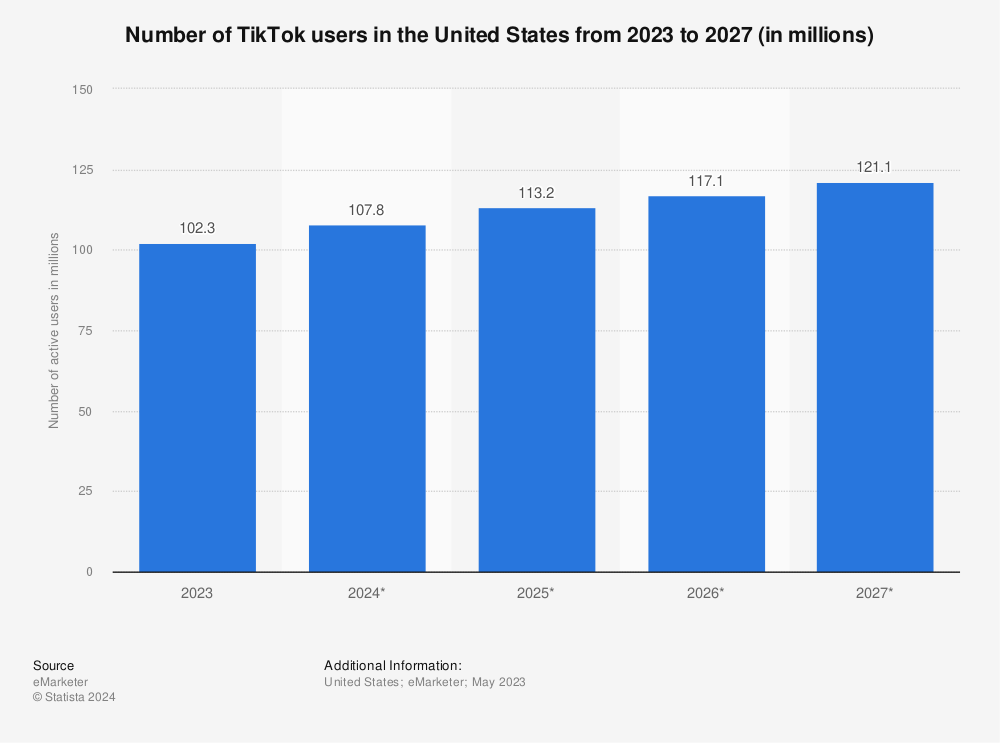The U.S. House of Representatives recently passed legislation that could lead to a ban on TikTok unless its parent company, ByteDance, divests its stake within a year. This decision, embedded within a foreign aid package for Ukraine and Israel, has fast-tracked the process, amplifying a broader geopolitical tech war between the U.S. and China.
While the ostensible goal is to protect national security, the implications of such a ban could ripple out, affecting free speech, innovation, and the very fabric of digital engagement among millions of American youths.
Free Speech and Innovation at Stake
The argument that TikTok should be banned for national security purposes overlooks a critical aspect of American ideals: freedom of speech and expression. TikTok has become a platform where millions of users, particularly young Americans, express their creativity, share their lives, and voice their opinions. Imposing a ban could set a dangerous precedent for internet freedom and innovation in the U.S.
[blockquote text=”We will not stop fighting and advocating for you. we will continue to do all we can, including exercising our legal rights, to protect this amazing platform that we have built with you” refrence=”TikTok’s CEO Shou Zi Chew”]
This sentiment highlights the potential stifling of innovation and expression that a ban could herald, impacting not only the 170 million U.S. users of TikTok but also the broader landscape of digital freedoms.
Geopolitical Implications: The U.S.-China Tech War
The TikTok ban is more than a security measure; it’s a new front in the ongoing U.S.-China tech war. By targeting a successful Chinese company, the U.S. escalates a battle over technology and global tech leadership. This approach fails to address underlying issues such as mutual respect for market access and fair competition, instead fostering a retaliatory environment that could hinder international tech development.
[blockquote text=”As we consider the implications of banning TikTok, we must recognize that this is not merely a question of security but a significant chapter in the broader U.S.-China tech war,” refrence=”Dr. Emily Peterson, a technology policy expert at the Brookings Institution”]
Young Americans and Political Engagement
One cannot ignore the timing and potential repercussions of such legislation on political engagement, particularly among the youth. TikTok not only serves as a platform for entertainment but also as a space for civic engagement and political discourse. The fear among some Democratic strategists that banning TikTok could disengage young voters is not unfounded.
With a platform that reaches 170 million U.S. users, many of whom are below the age of 30, the political implications are significant. A ban could inadvertently reduce the political participation of a demographic increasingly disenchanted with traditional media and political communication.
Economic Fallout: A Look Beyond the Ban
The economic implications of a TikTok ban are profound. TikTok contributes an estimated $24 billion annually to the U.S. economy and supports millions of businesses and jobs. Removing such a platform not only disrupts this economic contribution but also eliminates a critical marketing and engagement tool for small businesses.
This aspect alone should give legislators pause, considering the broader economic destabilization that could follow.
In my opinion, TikTok should not be banned in the USA, even though such a ban may benefit the 𝕏 platform.
Doing so would be contrary to freedom of speech and expression. It is not what America stands for.
— Elon Musk (@elonmusk) April 19, 2024
Privacy Concerns: A Double-Edged Sword
Privacy is a legitimate concern. TikTok has been accused of data privacy violations, a worry not unfounded given the revelations of ByteDance employees allegedly spying on U.S. journalists. However, these concerns are not unique to TikTok. U.S. companies like Meta and Google have also faced similar scrutiny over data handling practices.
Ayo, in case you missed it, please take a second to appreciate the irony and blatant in-your-face disrespect of a government that wants to ban TikTok to protect your privacy but just voted to keep warrantless wiretaps.
— Ian Smith (@iansmithfitness) April 21, 2024
The solution, therefore, should not be a ban but rather a stringent, transparent regulatory framework that applies to all companies, ensuring user data protection without stifling global tech innovation.
Cultural Impact and Digital Sovereignty
Culturally, TikTok has reshaped how content is created and consumed. It’s a trendsetter in music, fashion, and social interaction. Banning TikTok would not only remove a platform for cultural expression but also raise questions about digital sovereignty—where nations impose boundaries on the global internet landscape, potentially leading to a fragmented, less open web.
[blockquote text=” TikTok has become the leading destination for short-form mobile video, offering exciting, spontaneous, and genuine content. It’s not just about entertainment; it’s also a platform for creativity and expression that transcends borders and languages. Our community comes to TikTok to share their joy and express themselves through their creativity — it’s built into the DNA of what TikTok is all about.” refrence=”Kevin Mayer, former CEO of TikTok”]
Why Do They Want to Ban TikTok, Anyway?
The ongoing campaign to ban TikTok in the United States is not just about protecting national security or safeguarding personal data—it’s also a vivid illustration of the growing tech Cold War between the U.S. and China. The ban represents a battleground for digital supremacy, where geopolitical motivations overshadow logical policy decisions. Here’s why this is happening:
- Data Privacy as a Smokescreen: While the official stance is that TikTok poses a significant data privacy threat due to potential access by the Chinese government, this argument often feels more like a smokescreen. Major U.S. tech companies also harvest vast amounts of user data, yet they face less severe repercussions. This selective scrutiny raises questions: Is TikTok being targeted because it’s a non-American entity succeeding on American soil?
- Geopolitical Chess: Banning TikTok serves as a strategic move in a larger geopolitical game. It’s a way to strike at a prominent symbol of Chinese innovation—a platform that has managed to penetrate deep into American culture, something few other Chinese companies have achieved. This isn’t just about data; it’s about containing China’s influence and presence in the global tech arena.
- The Illusion of Security: The narrative that TikTok is a unique threat to national security conveniently ignores the broader issue of global data-sharing practices across the tech industry. This selective targeting suggests that the ban is less about securing personal data and more about asserting U.S. dominance in global tech.
- Cultural Threat: Beyond data and politics, TikTok represents a cultural shift. Its algorithm’s ability to amplify diverse voices and international content challenges the traditional American media hegemony. The fear isn’t just that TikTok could be a tool for Chinese propaganda but that it disrupts the established cultural and media flows controlled by Western entities.
- Reciprocity or Protectionism?: Advocates for the ban cite the lack of market access for American companies in China as a justification. However, using TikTok as a pawn in a tit-for-tat economic strategy underlines a protectionist stance that could stifle global tech innovation and market dynamics.
Seeking Alternatives to a Ban
Given the complexities and potential ramifications of a TikTok ban, alternative solutions should be considered. These could include enforcing stricter data security measures, mandating transparent user data handling, or promoting a divestiture model that maintains TikTok’s operational independence. Such measures could address security concerns without the collateral damage of an outright ban.
Additionally, employing a Virtual Private Network (VPN) can offer a temporary workaround for users concerned about maintaining access to TikTok amidst potential restrictions. VPNs help mask your internet footprint, allowing you to access TikTok servers as if you were in a country where it remains available.
For those looking for robust solutions in this area, exploring the best VPNs for TikTok can provide the necessary tools to continue enjoying the platform’s rich, creative content securely and privately.
Banning TikTok might seem to solve a complex problem of data security and foreign influence. However, it touches upon deeper issues of free expression, economic impact, and digital policy. As this bill moves through the Senate, lawmakers must consider not just the immediate implications of such legislation but the long-term effects on America’s technological leadership, free speech, and global digital strategy.
Rather than a ban, a balanced approach that safeguards security while promoting freedom and innovation is essential. This way, we do not sacrifice the vibrancy and openness that define our digital age for the sake of illusory security.

